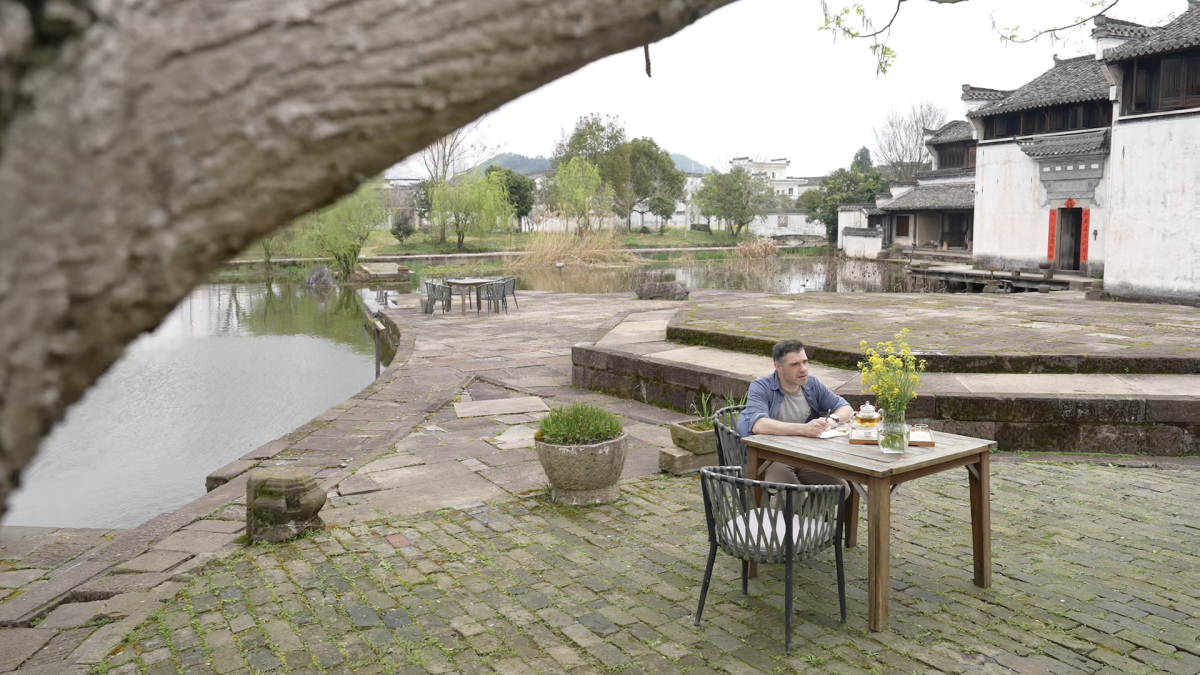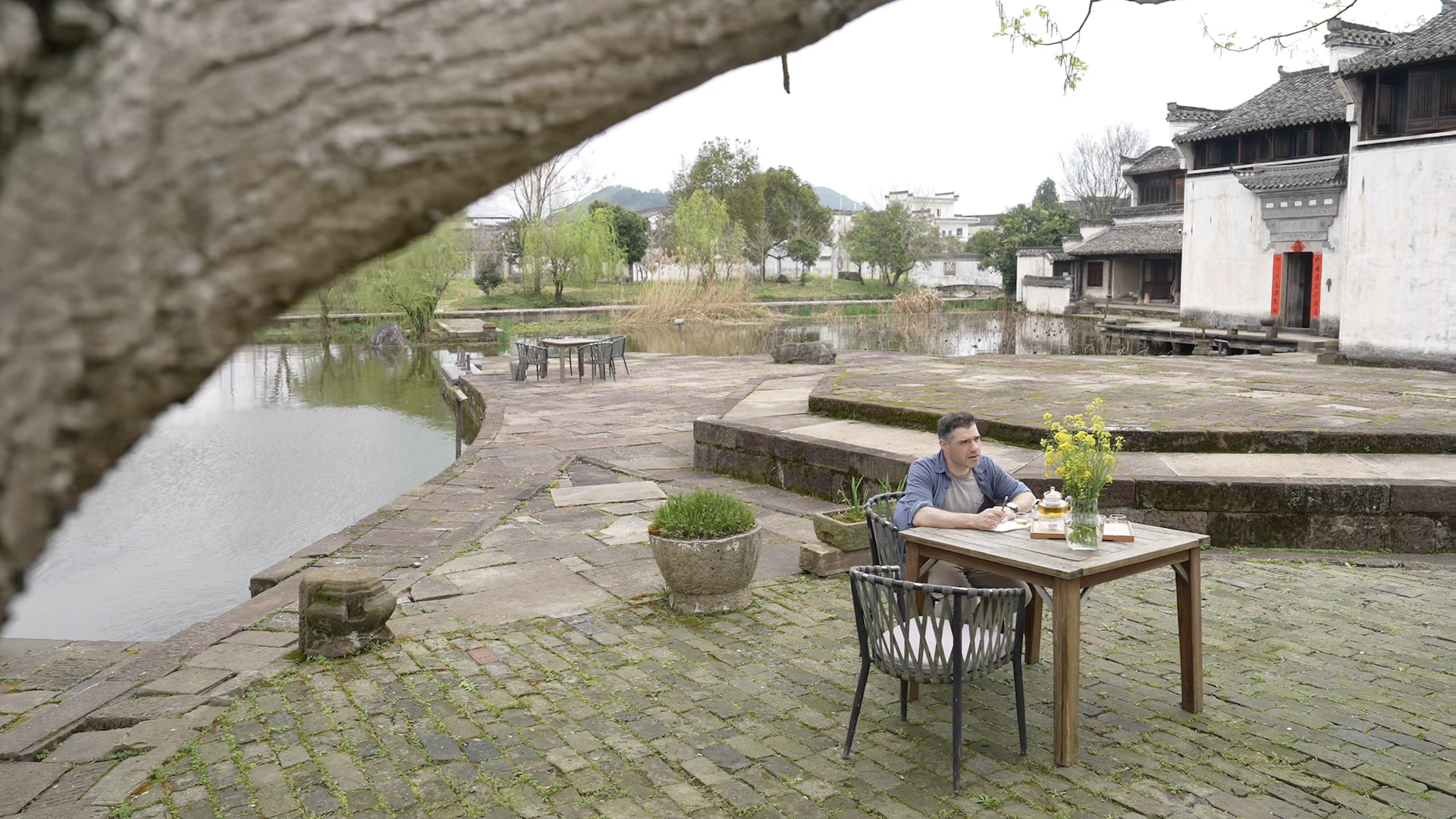Editor’s Note:
Looking back on the brotherhood between China and the Philippines that former Philippine president Rodrigo Duterte highlighted during his visits to China while in office, many Chinese people fondly remember the friendly atmosphere between the two countries during his presidency, and appreciate the independent foreign policy the former leader pursued.
When the Global Times recently visited the Philippines, many local people praised Duterte for the significant improvements he made in social security, public wellbeing, and the economy. On local social media apps in the Philippines, one can also see many people sharing videos of Duterte’s life after retirement.
Recently, Global Times reporters Hu Yuwei, Fan Wei, and Zou Zhidong (GT) visited and exclusively spoke with Duterte (Duterte) in Davao, the Philippines, where he repeatedly called for rational and friendly dialogue with China on current intense bilateral relations.
He expressed sadness over the disputes in the South China Sea and the policies adopted by the current administration toward China. He warned that the US is trying to provoke a war between China and the Philippines and cautioned that the US will not risk American lives for Filipinos. He hopes that the Philippines can turn back from its detrimental path and resolve issues through dialogue and negotiation.
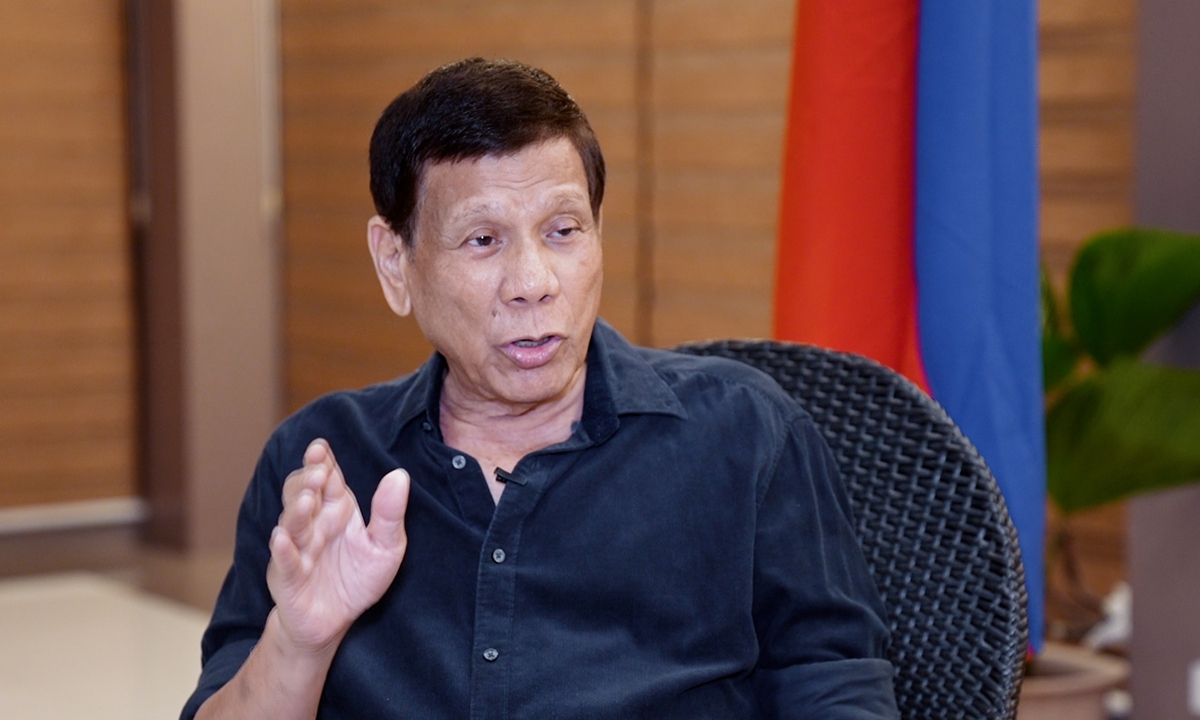
Former Philippine president Rodrigo Duterte Photo: Zou Zhidong/Global Times
GT: Based on current China-Philippines relations, what kind of message would you like to convey to the people of both the Philippines and China?
Duterte: First of all, I would like to express my deep appreciation for China and the Global Times for coming here to interview us and talk about the relations between China and the Philippines. We should deal with the geopolitical mess that we are in. So China could get a clear view, at least around the former president of what we would like to happen between the Philippines and China.
When I was elected as president then (in 2016), I tried to craft an independent foreign policy, not really against America. I have no quarrel with America. But the problem was our foreign policy was dovetailing theirs, and not so good with China. So I started on a neutral foreign policy. I announced to the world that I had no friends and no enemies to fight. I just want to be neutral. And I did not have to kowtow to anybody’s foreign policy, especially the Americans. I know that the previous administrations were always favoring the Americans in everything. Whatever be the events, whatever be the problems of Southeast Asia or the world, for that matter, it seems that China here in Asia is doing everything that is possible to encourage that we gather as good neighbors, especially when President Xi Jinping proposed the Belt and Road Initiative (BRI). That was really intended to galvanize relations between Asian countries.
But America, from a foreign policy standpoint, appears to be very hostile. So if you stick with America, if you identify yourself with America, then everything becomes blurry with our relations with China and the rest of the ASEAN countries.
Most of the ASEAN countries have followed a very neutral, independent foreign policy. I would have wanted that. Had I listened to the advisors of government, I could not have improved the relations between the Philippines and China. That is why I slowly detached myself, and, at least in foreign policy, and announced to China that we are not enemies, that we have never been, and never will be in our lifetime.
Now the BRI was meant to attract cooperation between ASEAN member states and China. America was very wary about that, very suspicious, and so they called us not to join as it was “bait for us.” There’s nothing wrong with economic cooperation. So I made it clear that I was more of a friend.
I must reiterate that I do not have a quarrel with the America. I just don’t like their behavior. Their behavior is because at one time or another, they were imperialists. After Spain, they also occupied my country. And even though they say that it was good for the Philippines that they came and educated us, that’s nonsense.
We could have developed on our own. We do not need anybody. We do not even need China. We could have developed the Philippines on our own without any interference from anybody.
Now in terms of geopolitics and trade, we have robust trade relations between China. Before I went to Beijing, the durian fruit and mangos were not acceptable to China. After I visited China and talked to the president, humbly asking [the Chinese government] to consider the plight of my nation, so that we earn money at least through our exports, because we are an agricultural country. When I came home, China opened the door.
So I was very appreciative of the brotherly gesture, almost like to cry. That was really very kind to us Filipinos.
Now even in the bilateral trade, China is near, America is far. We have some trade relations with America but not good for a day-to-day, like food. I don’t think that we have really good trade relations with America. Maybe they are kind, I do not care to know, because I’m not interested.
Now our bilateral relations [with the US] focus on trade and maybe defense. We’ve been talking about it. There are issues with the island of Taiwan. We do not tinker with Taiwan. Taiwan is a province of China so we understand.
Here in the West Philippine Sea (South China Sea), when I was president, there was no quarrel. We can return to normalcy. I hope that we can stop the ruckus over there, because the Americans are the ones pushing the Philippine government to go out there and find a quarrel and eventually maybe start a war.
So I am very sure of that – America is giving the instructions to the Philippine government to “not be afraid because we will back you up.”
But I do not think that America will die for us. And yet America has so many bases in the Philippines now; I objected to it when the US wanted to build a military base in Philippines. Then with the consent of the president of the Republic of the Philippines, they have so many bases.
I am sorry for my country. I am not the president anymore. I cannot run. But if there is a way we can reverse the situation, we might find a way inside to implode somewhere. And if God would allow it then perchance I would be able to reverse the situation. I would remove the bases.
And I would tell the Americans, you have so many ships, so you do not need my island as a launching pad or as a launching deck for you.
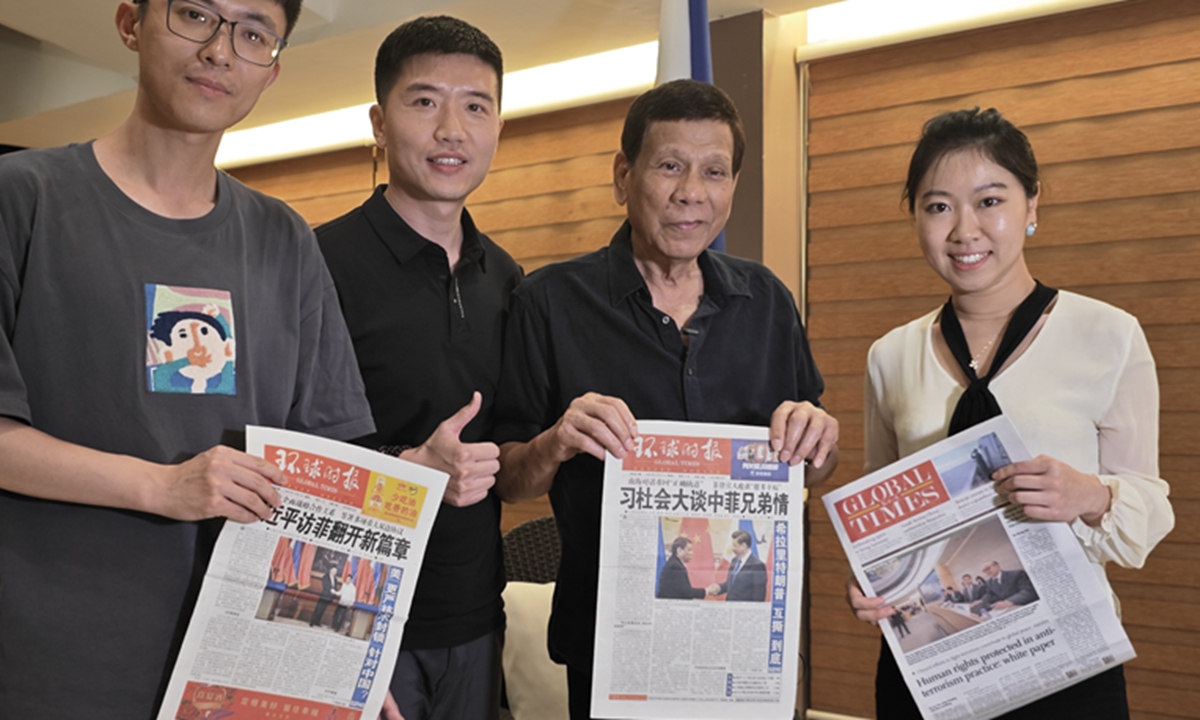
Global Times reporters take a photo with former Philippine president Rodrigo Duterte on March 26, 2024, in Davao, the Philippines. Photo: Courtesy of Duterte’s office
GT: What are your feelings about the change of the friendly diplomatic policy toward China that you always pursued and the peace you created in the South China Sea?
Duterte: I’m very sad. And I hope that we can bring it back again. With the present situation, there has to be a plan.
GT: The current Philippine government has taken a more hardline stance on the South China Sea issue, including the Senate’s passage of the Maritime Zones Act, and has attempted to push more fishermen into disputed waters, which is seen as not conducive to dialogue and peaceful settlement. What’s your comment?
Duterte: It’s not been possible to talk since the current administration took office. Maybe one remedy is I can talk to the Chinese government. We can talk about easing up a little bit; And I will tell the people that this is the protocol that China wants too, and that it’s good.
During my term, China allowed fishing [by Philippine fishermen] and nobody was disturbing them.
So, if you want a mid-term change, a radical change, we will have a hard time. You can begin to talk to others, not necessarily with me, but with others. But I’m the only one who’s visible right now because I am not afraid of the situation.
GT: During your visit to China in October 2016, we saw a great improvement in China-Philippines relations, and the Chinese side made proper arrangements regarding your concerns. Do you remember how the consensus was reached at that time?
Duterte: The Chinese side allowed us to go there to fish. We do not quarrel with that. We do not ask for any solution to this issue now. We just leave it that way as long as there are no military [conflicts].
It was a very good arrangement. Everybody was happy. And if China should also go there and fish, then go there and fish. If the catch is already enough, then they can go back home.
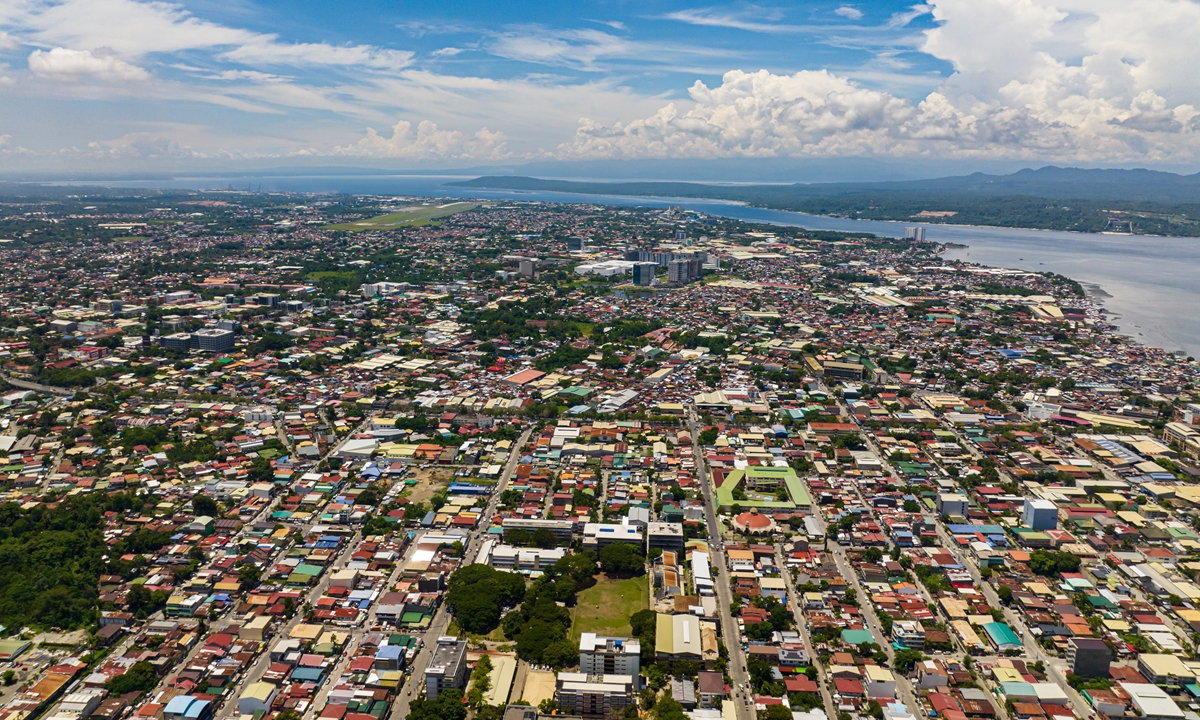
The city of Davao, the Philippines Photo: VCG
GT: The current Philippine government has strengthened its military ties with the US, opening up new military bases in the Philippines and there have also been some voices shifting toward the US economically. How do you view the “deepening” of US-Philippine relations?
Duterte: It is very hard to comprehend the Philippines detaching a little bit and remaining neutral. That cannot happen until the end of the current term. We’ll just have to wait it out. But in the meantime, we should educate the Filipino people and I can always go back to my public life.
I am retired, but I suppose I can still stand and call for a press conference and express my views about it and express my sentiments.
We have bilateral relations with America, but if your foreign policy is crooked or favors one country and is sometimes hostile because you are with America, then everything is wrong. That is the problem.
In terms of the Taiwan question, I said that’s a province of China. There was a revolution (Chinese People’s War of Liberation) in China between Chairman Mao Zedong of the Communist Party of China and the Kuomintang. They (Kuomintang) retreated to an island, which is a part of China. And some in Taiwan want to be independent, and America is supporting them, despite the fact that they know it is illegal because Taiwan is part of China’s territory. That’s the problem.
So, including the West Philippine Sea (South China Sea) and the island of Taiwan, and asking for bases, a foreign policy that is not taken care of by the government by allowing itself to be attached to another country, is really at war every day.
In the matter of principle, there is a quarrel going on because there is the US telling everybody, “Okay, you fight. Do not be afraid because we are here.” It’s antagonistic and hostile.
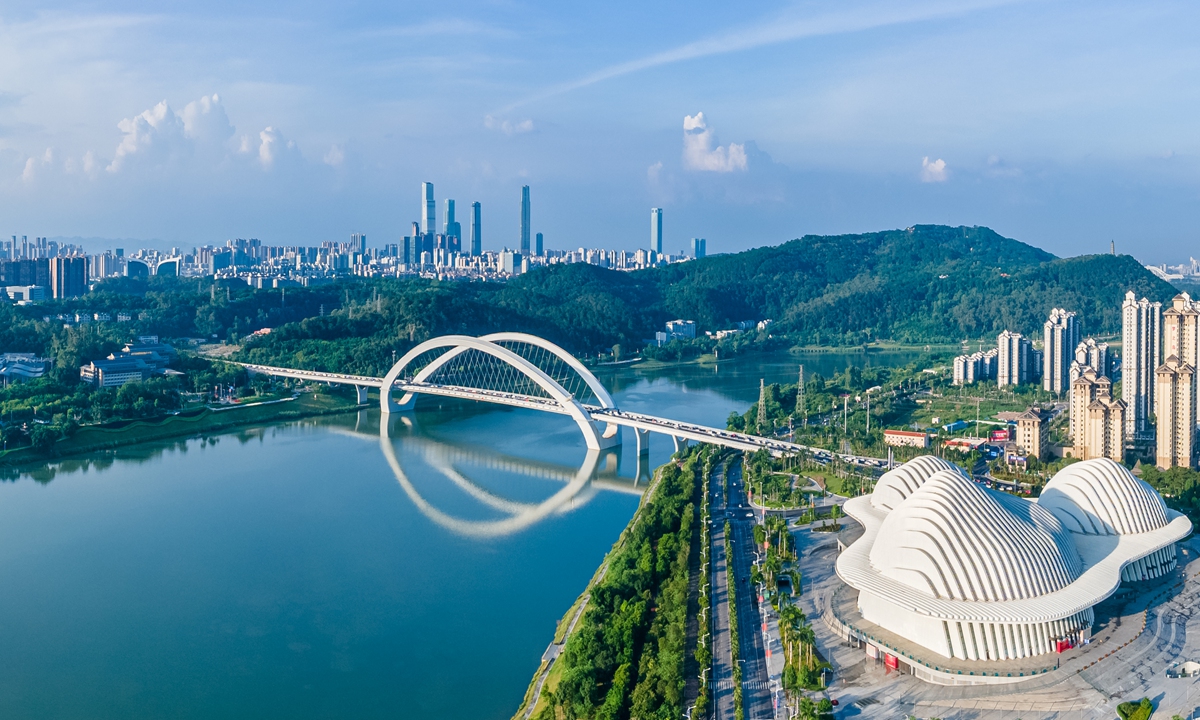
A view of the city of Nanning, South China’s Guangxi Zhuang Autonomous Region. Nanning is a Chinese sister city of Davao. Photo: VCG
GT: How do you think China and the Philippines can return to the table of dialogue and negotiations on the South China Sea issue?
Duterte: It will come after Marcos. We will just have to wait. You cannot talk to him because it is the Americans that will tell him what he should say to you. So it’s forever a cycle of incongruity.
Lastly, I would say that we are not enemies.
Remember that. We do not have any quarrel with China. We know that if it would come, it would come because of the Americans. So we have to accept it because our government admittedly allowed it.
But we will always be friends. I can assure you.
Maybe we can look for ways to convince political leaders that this president is dragging us through a situation that can harm the relations between China and the Philippines.
GT: People have given you various tags regarding your governing style. For example, among your political opponents, there is a voice that believes you are too friendly to China on the South China Sea issue. However, many Chinese people are full of praise for the strong and powerful actions you’ve taken to deal with drugs and terrorism, as well as your independent foreign policy approach despite pressure from the US, and they often refer to you as a man of iron will, or a strong leader. What do you think of all these tags?
Duterte: First of all, let me explain. In the matter of foreign policy, and even in the matters of governance, it is a matter of principle.
The principle that I see is that I see things from the right perspective.
That is, whether or not it would be good for my country to remain neutral and not to entertain invasive activities.
The second is in governance. I’m a hardliner, especially on drugs, criminality, and every facet of governance. But I try to be friendly with all. And it’s not a pretend friendship with China.
I really love China more than the Americans, simply because I do not believe in their habit, and the habit of saying things and doing what they are doing now. It is a pity that the BRI program has been slowed down [in the Philippines], maybe because of the economy. But I still hope that China will grow more powerful.
I dream of China and the Philippines working together; of better people-to-people exchanges. Most of the Filipinos are pro-American because of the educational system; I dream of Filipinos also gaining new views. There’s a school in Fujian named after my mother; an exchange of peoples brings better trade and better bilateral relations.
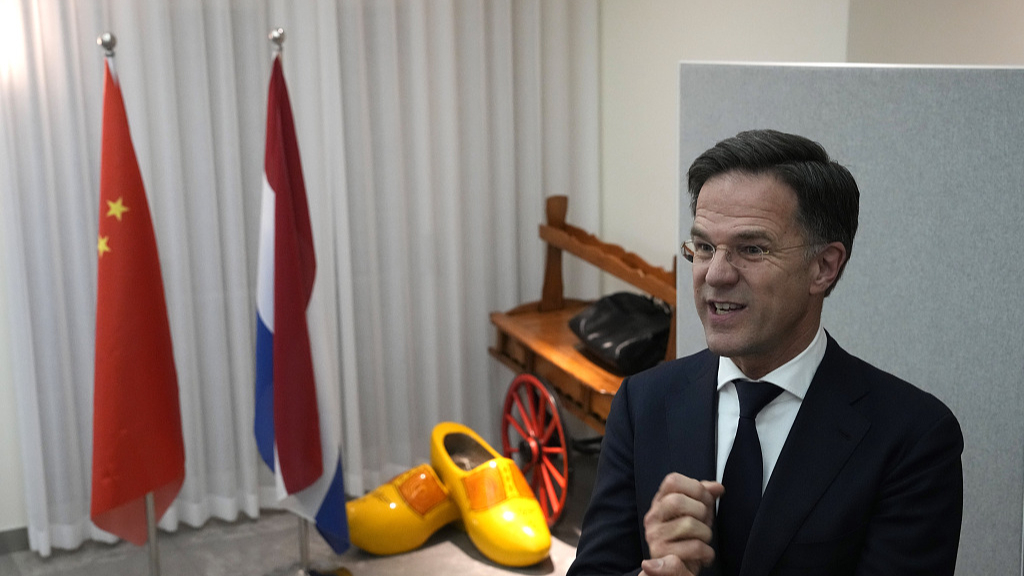 Dutch Prime Minister Mark Rutte speaks to journalists at the Dutch embassy in Beijing, March 27, 2024. /CFP
Dutch Prime Minister Mark Rutte speaks to journalists at the Dutch embassy in Beijing, March 27, 2024. /CFP 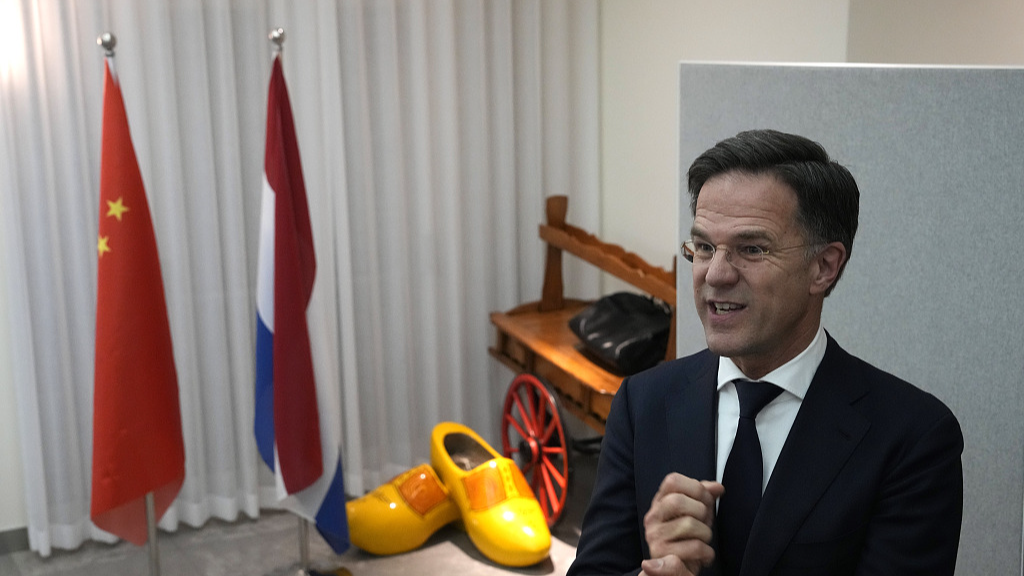
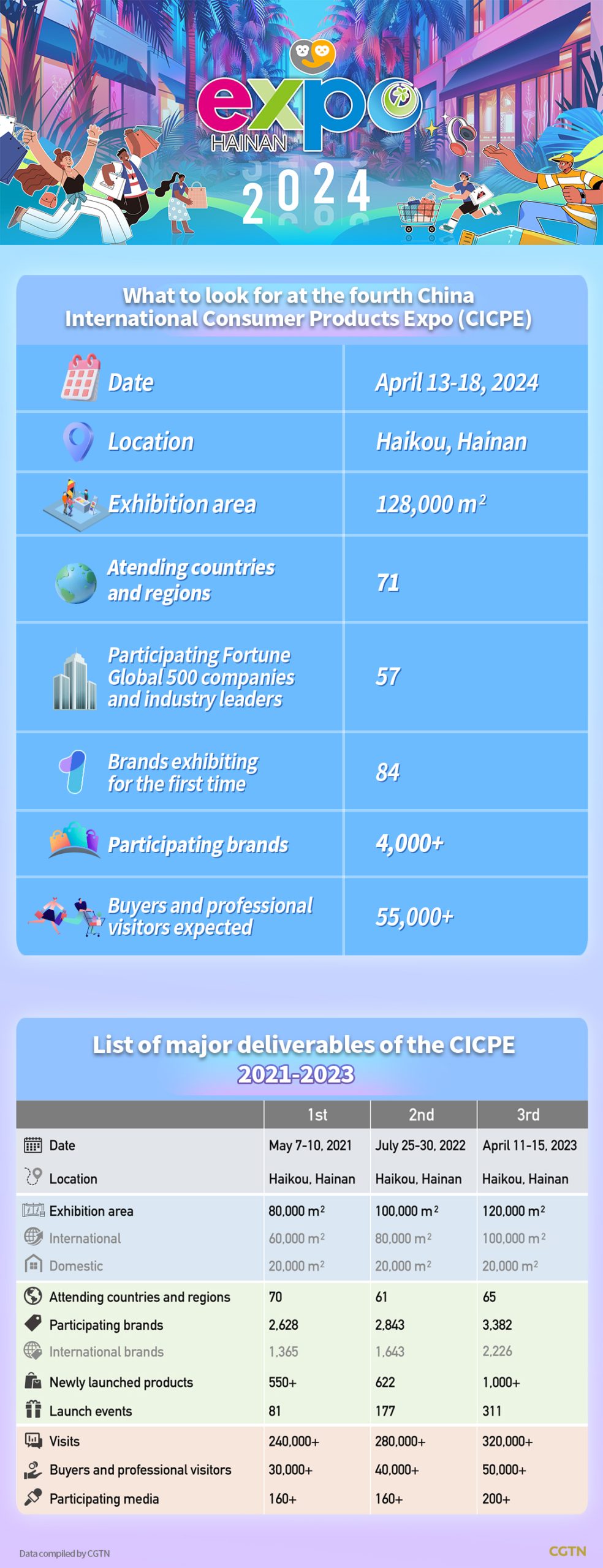
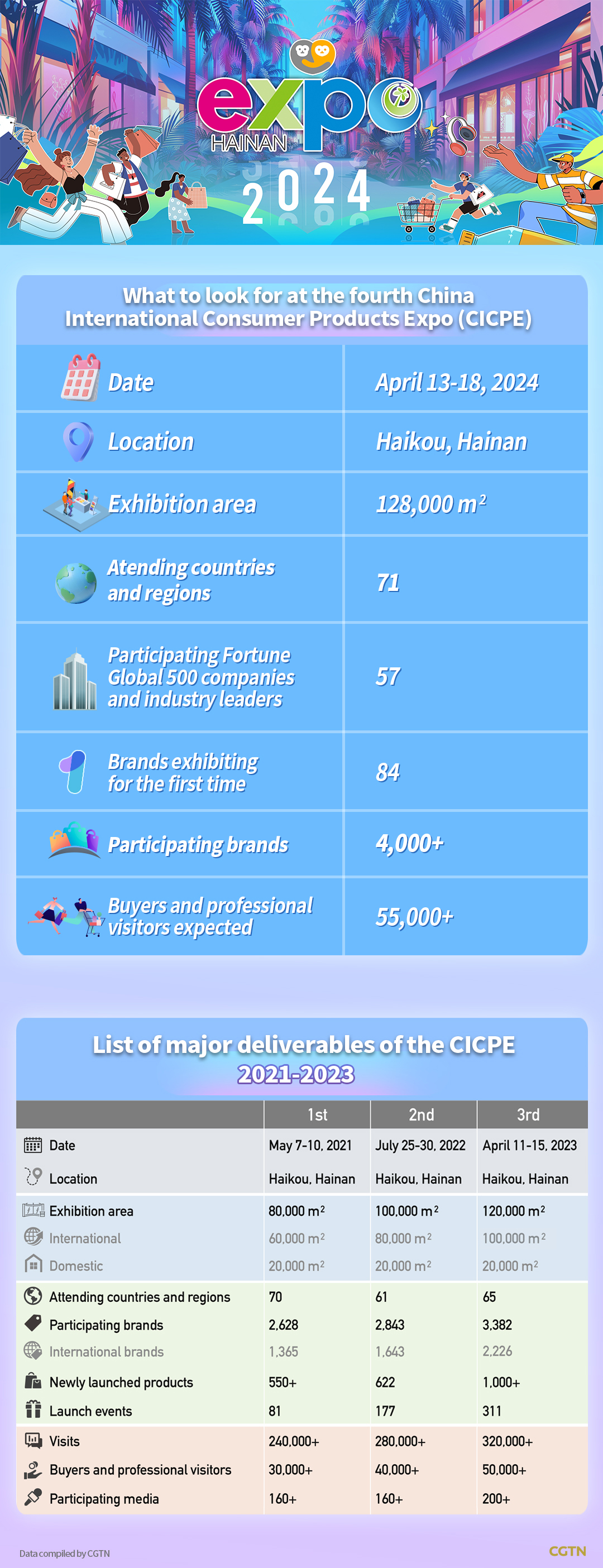
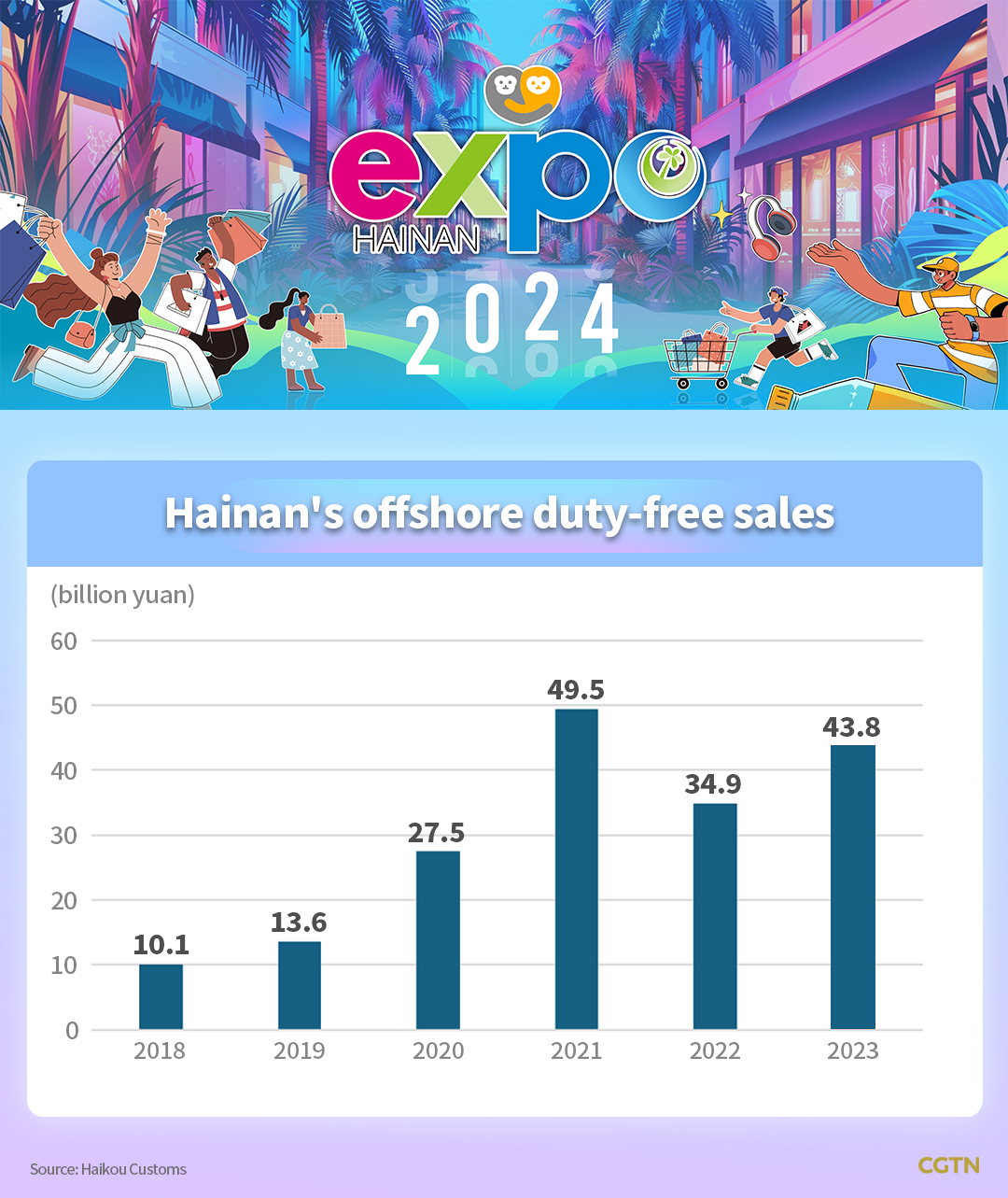
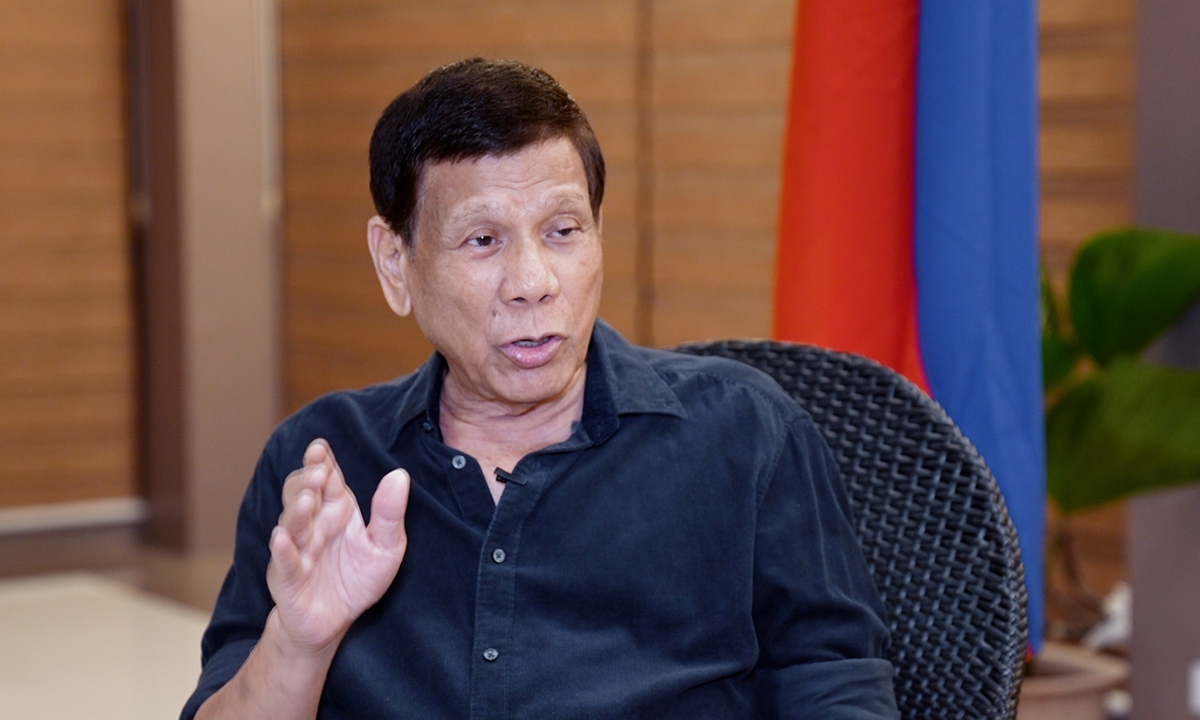




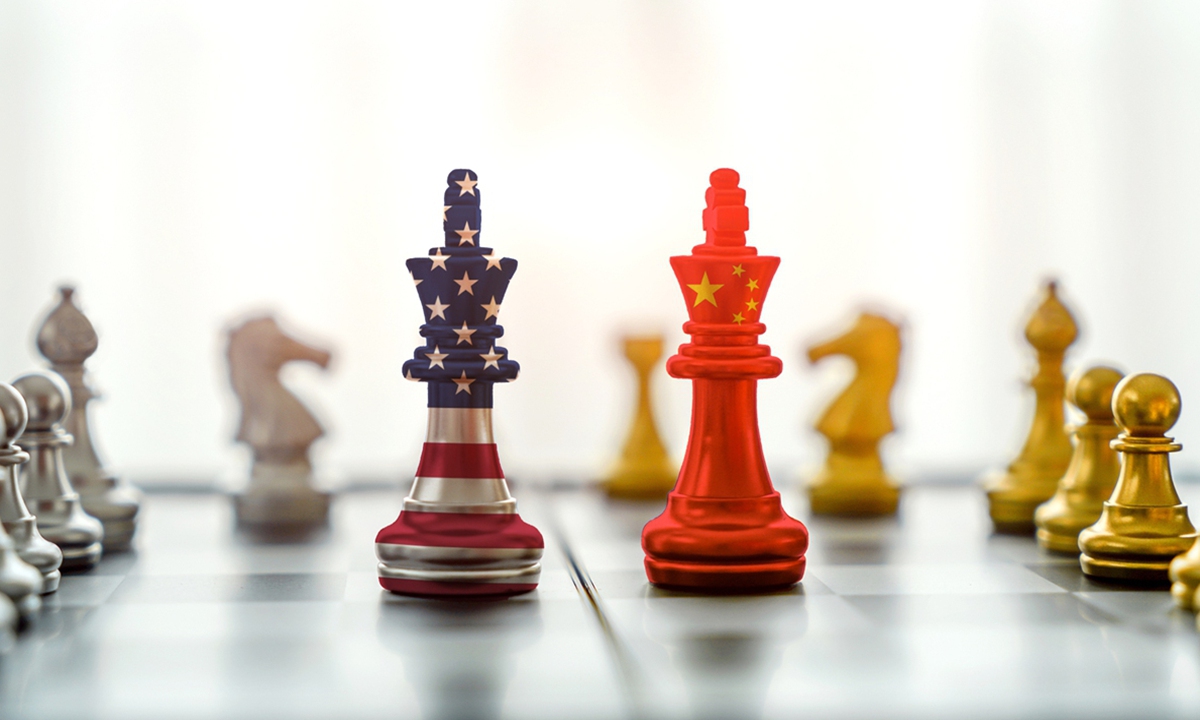
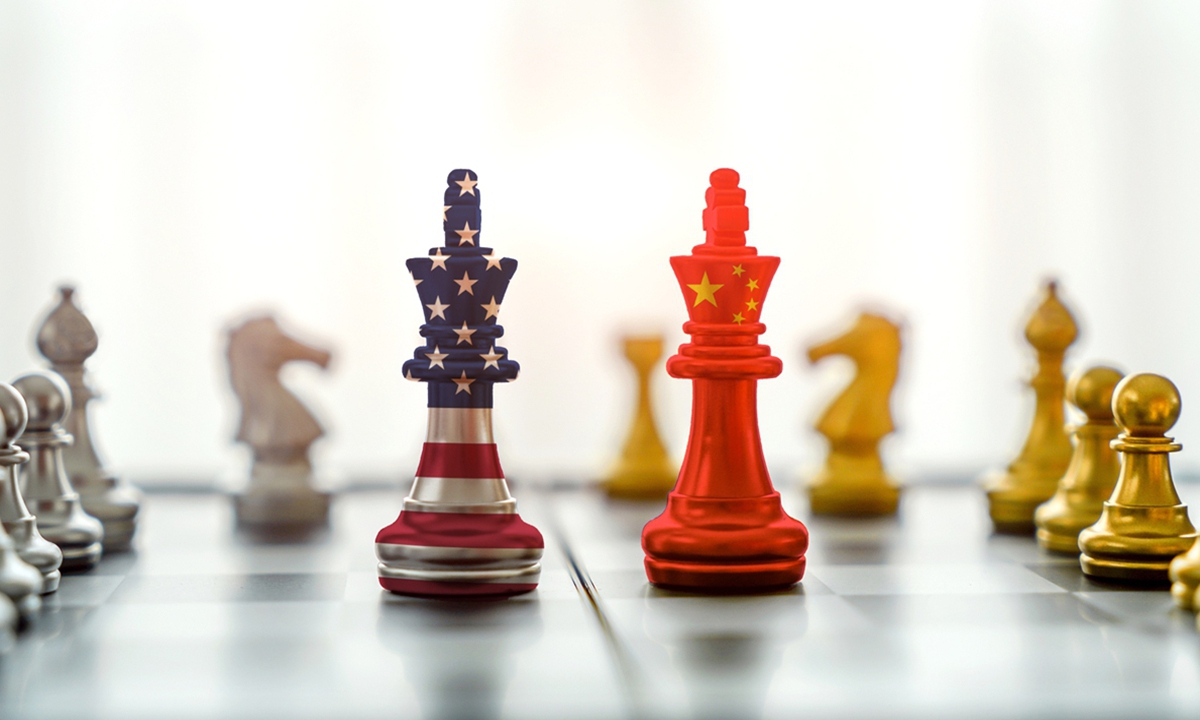




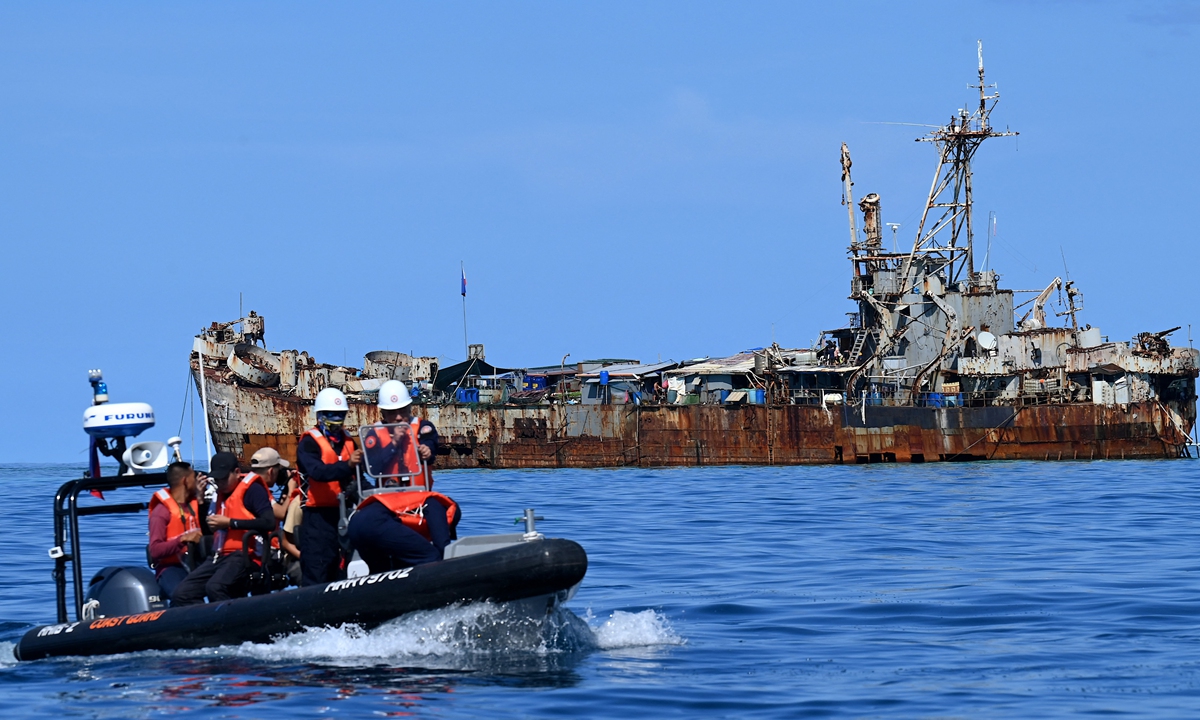
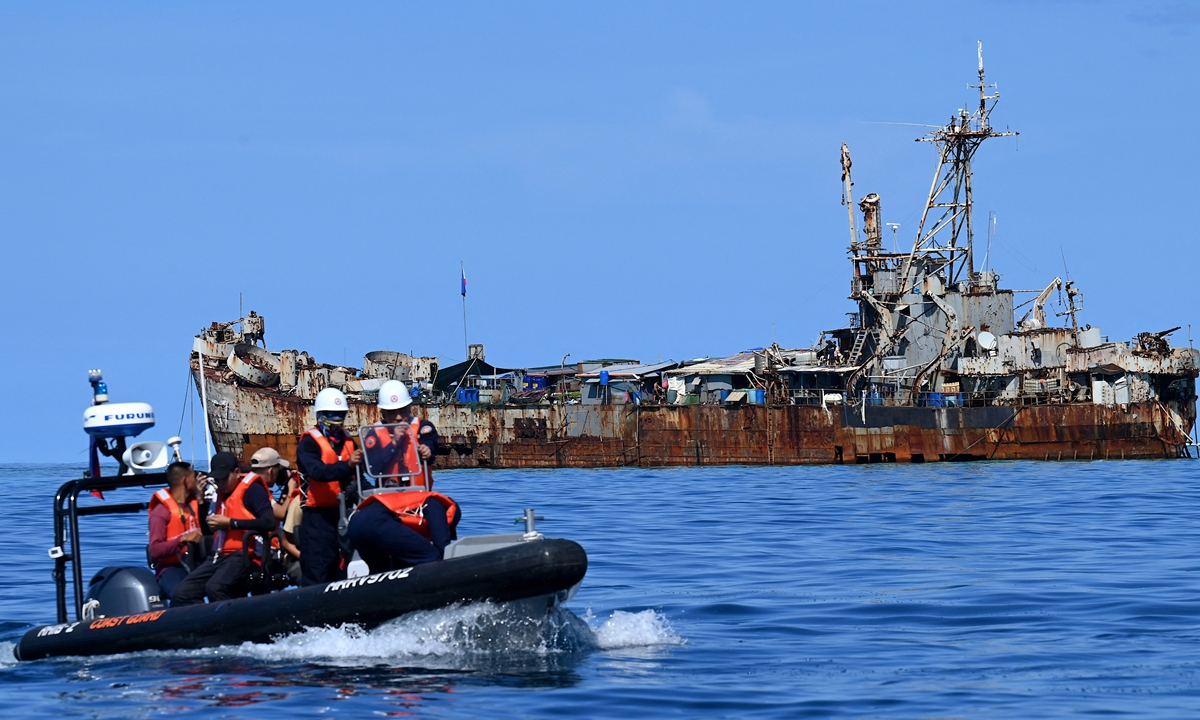
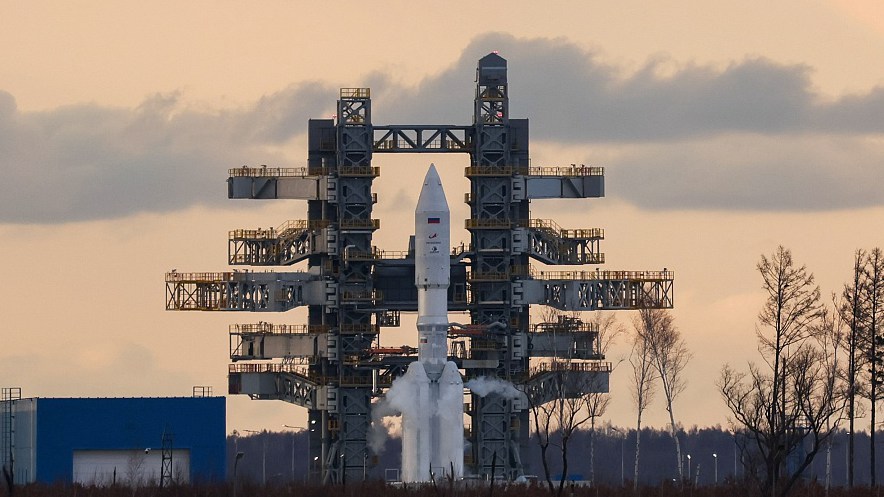
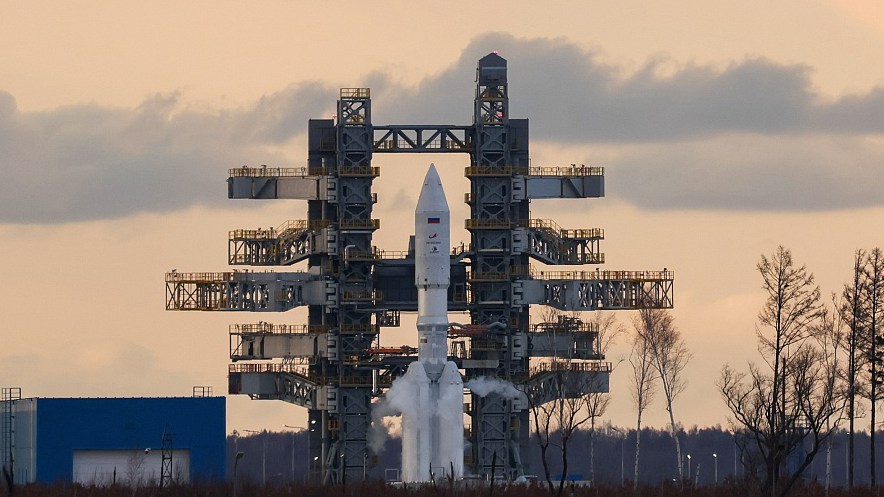 The Angara-A5 launch vehicle carrying the Orion booster and a test payload on a launch pad at Vostochny Cosmodrome, April 10, 2024. /CFP
The Angara-A5 launch vehicle carrying the Orion booster and a test payload on a launch pad at Vostochny Cosmodrome, April 10, 2024. /CFP 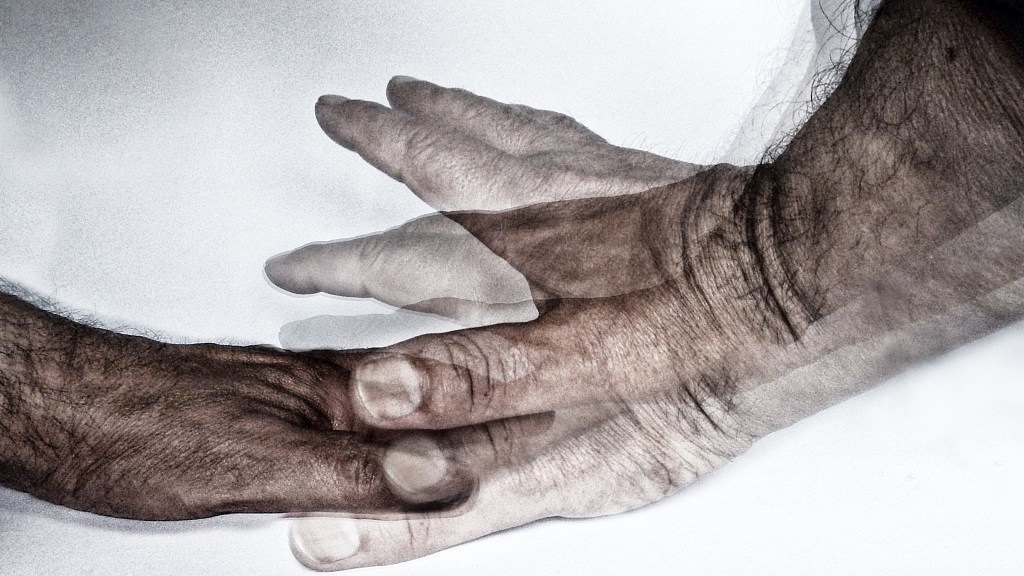
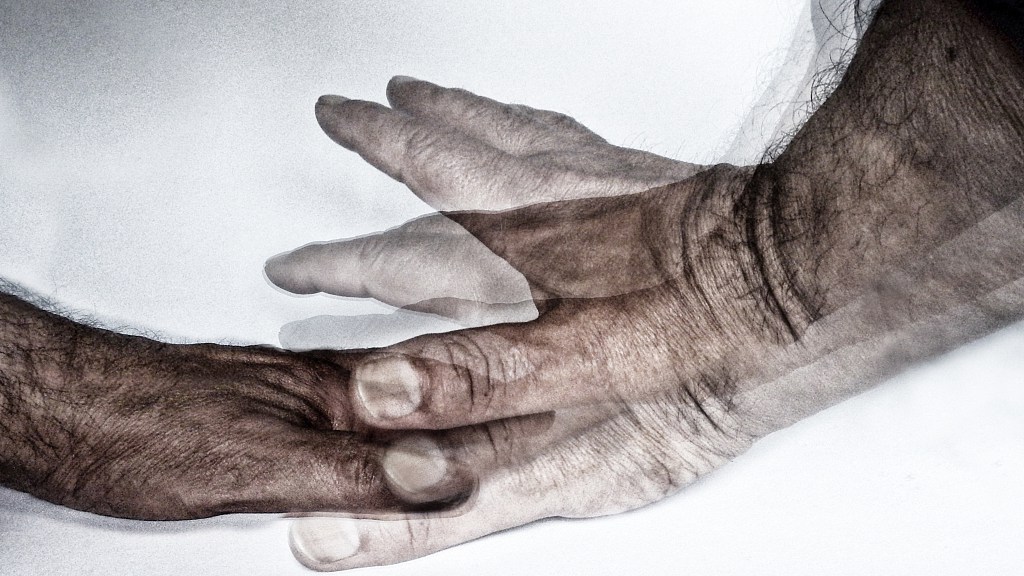 Parkinson disease impairs people’s motor function. /CFP
Parkinson disease impairs people’s motor function. /CFP 